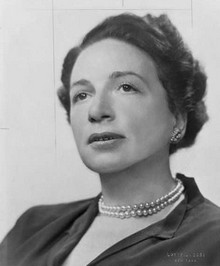Hortense Powdermaker facts for kids
Quick facts for kids
Hortense Powdermaker
|
|
|---|---|

Powdermaker in 1950
|
|
| Born | December 24, 1900 Philadelphia, Pennsylvania
|
| Died | June 16, 1970 (aged 69) Berkeley, California
|
| Scientific career | |
| Fields | Anthropology, ethnography |
| Academic advisors | Bronisław Malinowski |
Hortense Powdermaker was an American anthropologist. She was born on December 24, 1900, and passed away on June 16, 1970. She is well-known for her studies of different cultures. She researched the lives of African Americans in rural areas. She also studied the movie industry in Hollywood.
Becoming an Anthropologist
Hortense Powdermaker grew up in Reading, Pennsylvania, and Baltimore, Maryland. She went to Goucher College and studied history. She graduated from college in 1921.
After college, she worked to help factory workers. She helped them form groups called unions. But she felt it was hard to make progress for workers' rights in the U.S. So, she decided to leave the United States.
She went to study at the London School of Economics in England. There, she met a famous anthropologist named Bronisław Malinowski. He encouraged her to study anthropology for her PhD. She also learned from other important anthropologists like A. R. Radcliffe-Brown and E. E. Evans-Pritchard.
In 1928, Powdermaker earned her PhD. For her research, she traveled to New Ireland. This island is in what is now Papua New Guinea. She studied the Lesu people there. She wrote a book about her experiences called Life in Lesu.
Studying Different Communities
After her studies in London, Powdermaker came back to the United States. She got a job at the Yale Institute of Human Relations. Her boss, Edward Sapir, suggested she study communities in her own country.
From 1930 to 1937, she worked at Yale. During this time, she lived in an African-American community. This was in Indianola, Mississippi, from 1932 to 1934. She wrote a book about this experience called After Freedom.
In 1938, she started working at Queens College in New York. She helped start the Anthropology and Sociology departments there. She worked at Queens College for 30 years.
Later, she studied the film industry in Hollywood. She wrote a book called Hollywood, the Dream Factory in 1950. This was the first time an anthropologist had studied Hollywood in such detail. She also studied mining in Northern Rhodesia (now Zambia). She looked at how American media was used there. Her book about this was Copper Town: Changing Africa (1962).
Her last book was her memoir, Stranger and Friend: The Way of an Anthropologist (1966). In this book, she shared her personal journey as an anthropologist.
Later Life and Impact
In 1968, Hortense Powdermaker retired from Queens College. She moved to Berkeley. Even in retirement, she continued to do ethnographic fieldwork. She passed away two years later from a heart attack.
Today, a building at the Queens College campus is named after her. It houses the anthropology and sociology departments. This shows how important her work was to the college and to the study of people and cultures.
See also
 In Spanish: Hortense Powdermaker para niños
In Spanish: Hortense Powdermaker para niños
 | Delilah Pierce |
 | Gordon Parks |
 | Augusta Savage |
 | Charles Ethan Porter |

